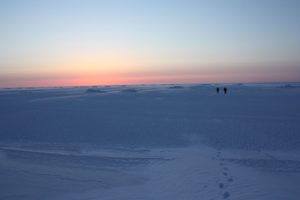
Researchers walk on winter shorefast sea ice in the Chukchi Sea (Photo credit: M.L. Druckenmiller / NNA-CO, University of Colorado Boulder)
As climate change warms the Arctic more than twice as fast as the rest of the planet, new challenges abound for the communities that live in the region, including food sovereignty, coastal erosion, increasing shipping traffic and more. The National Science Foundation’s Navigating the New Arctic (NNA) initiative aims to improve our understanding of the rapid, dramatic changes taking place in the region in order to better mitigate these challenges.
Beginning February 1, 2021, Alaska Pacific University, the University of Alaska Fairbanks, and the University of Colorado Boulder will host the Navigating the New Arctic Community Office (NNA-CO). Over the next five years, these universities will work together to provide leadership and support to researchers and Arctic communities to address this region’s biggest climate-related threats.
Navigating the New Arctic projects work to improve understanding of Arctic change and its impacts through convergence research, a unique approach to research that relies on the merging of ideas from different areas of expertise, including Indigenous knowledge.
APU will implement a Community Extension Office for Arctic communities, facilitating local and regional research partnerships to address community-defined issues and ensuring NNA research integrates Indigenous cultures, knowledge systems and research needs.
UAF will host an Education and Outreach Field Office to facilitate connections among teachers and students, researchers and communities to maintain coordinated, culturally appropriate and place-based education and outreach activities.
CU Boulder will host the central office for the NNA, partnering with APU and UAF to serve Alaska and the broader Arctic. The CU Boulder team includes research specialists from the National Snow and Ice Data Center (NSIDC), the Cooperative Institute for Research in Environmental Sciences (CIRES) and the Institute of Arctic and Alpine Research (INSTAAR).
“We welcome the opportunity to collaborate with other universities on Arctic research, and look forward to serving as a hub for Indigenous engagement,” said Valerie Nurr’araaluk Davidson (Yup’ik), president of Alaska Pacific University. “At APU, we are committed to honoring Alaska’s Indigenous heritage and preparing the next generation of Alaska’s leaders. Collaborative community-based research in the Arctic will benefit our country and our region, as well as our students and their communities.
“When it comes to research, Indigenous peoples often use the phrase, ‘Nothing about us without us is for us.’ We look forward to sharing our knowledge and passion for our homelands with our university partners as we collectively develop and support the goals of the NSF NNA Community Office.”
The community offices will support the goals of NNA and work to increase recognition of Indigenous knowledge and data sovereignty as well as promote inclusive and collaborative research design and implementation. Research and Indigenous advisory boards, facilitated by Dr. Nikoosh Carlo (Koyukon Athabascan), will guide the NNA-CO, offering expertise and advice on tackling both persistent and emerging challenges to collaborative, equitable and action-oriented research.
More information about the NNA-CO and its team can be found at www.nna-co.org. News relevant to the NNA-CO will be shared via Twitter @ArcticTogether. James Temte, ANTHC/APU project manager, will serve as APU’s point of contact and can be reached for questions at jtemte@alaskapacific.edu.
